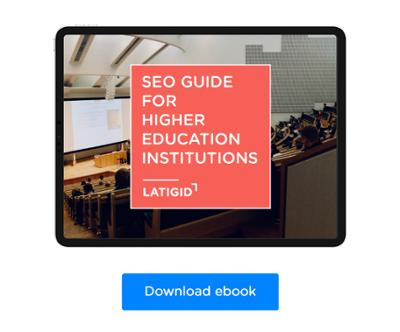
Digital marketing for universities has become a game-changer due to its unparalleled ability to reach a vast audience, precisely target potential students, and engage them in meaningful ways. Unlike traditional marketing channels, digital marketing enables universities to employ data-driven strategies, ensuring that every marketing effort is optimized for maximum impact.
The primary purpose of this article is to equip universities and higher education institutions with a comprehensive set of digital marketing tips that will empower them to build a robust online presence and attract prospective students effectively.
Understanding Your Target Audience
Before universities can effectively market their programs and offerings, they need to identify who their prospective students are. Universities can start by analyzing their current student body to identify common traits among their successful students. This can include factors such as academic interests, geographical locations, age groups, and socioeconomic backgrounds. Additionally, engaging with high school counselors, alumni, and parents can provide valuable information about the perceptions and motivations of potential students.
Online surveys and feedback forms can also be utilized to gather data directly from prospective students. This approach not only helps in identifying the target audience but also allows universities to understand the factors that influence their decision-making process when choosing an educational institution.
Related article: Boosting Enrollment in Higher Education Through Digital Marketing
Optimize Your Website for User Experience (UX)
To attract and engage prospective students effectively, universities must prioritize optimizing their websites for an exceptional user experience (UX). A seamless and user-friendly website not only leaves a positive impression but also plays a crucial role in converting visitors into enrolled students.
With the majority of internet users accessing websites through mobile devices, having a mobile-friendly design is no longer an option but a necessity. A responsive website automatically adjusts its layout and content based on the user's screen size, providing an optimal viewing experience across various devices, such as smartphones and tablets.
A user-friendly website should have intuitive navigation and a clear information architecture that allows visitors to find the information they need effortlessly. A well-organized website structure enhances user engagement and reduces bounce rates, leading to more meaningful interactions.
In today's fast-paced digital environment, users have little patience for slow-loading websites. Slow loading times can lead to frustration and prompt users to abandon the website, negatively impacting the user experience and potentially harming search engine rankings.
Content Marketing Strategies
Content marketing has become a cornerstone of digital marketing for universities. By producing valuable and engaging content, educational institutions can attract, engage, and nurture prospective students throughout their decision-making journey
Blogging is a versatile and effective content marketing strategy for universities. By regularly publishing informative and relevant articles, universities can position themselves as thought leaders and provide valuable insights to their target audience. Blogging not only boosts search engine visibility but also fosters engagement and encourages visitors to return to the website for fresh content.
Prospective students often seek validation from the experiences of current students and alumni. Showcasing student success stories and testimonials can be a powerful content marketing strategy to build trust, create emotional connections, and demonstrate the university's impact on students' lives.
Video content has emerged as a highly engaging and shareable medium, making it a potent content marketing tool for universities. Through videos, universities can showcase their campus life, academic programs, research projects, and student experiences in a compelling and visual manner.
Related article: How Content Marketing Can Improve Universities Visibility
Social Media Marketing for Universities
Social media has become an indispensable tool for universities to connect with their target audience, engage prospective students, and build a strong online presence.
With a multitude of social media platforms available, universities need to identify the ones that align with their target audience and marketing objectives. Each platform caters to different demographics and content formats, and understanding these nuances is vital to a successful social media strategy.
A well-structured content calendar ensures that universities maintain a consistent and engaging presence on social media. By planning content in advance, universities can align their posts with relevant events, milestones, and key dates, ensuring their content remains fresh, timely, and valuable to the audience.
Social media is not just a one-way communication channel; it is an opportunity for universities to actively engage with their followers and foster a sense of community. Responding to comments, messages, and mentions in a timely and personalized manner humanizes the university's brand and demonstrates that the institution values its audience.
Search Engine Optimization (SEO) Techniques
Search engine optimization (SEO) plays a crucial role in helping universities improve their online visibility and attract prospective students. SEO techniques involve optimizing websites to rank higher in search engine results, making it easier for students to find and explore relevant educational institutions.
Keyword research is the foundation of any successful SEO strategy. By identifying the keywords and phrases that prospective students are using when searching for educational opportunities, universities can tailor their content and website to align with these search queries.
On-page optimization involves optimizing individual web pages to improve their visibility in search engine results. By implementing on-page SEO best practices, universities can enhance the relevance and authority of their web pages, making them more appealing to search engines.
For universities, campus location is a crucial factor for prospective students. Leveraging local SEO techniques helps ensure that the university appears prominently in local search results when students search for educational opportunities in a specific area.
Related article: SEO for Universities: How to Drive More Traffic to your Website
About Latigid
We are a Higher Education Marketing Agency. We help you grow by increasing website traffic, generating more student leads, and closing those leads into enrollment. With a deep understanding of the latest industry trends and best practices, we are well equipped to help your institution grow.
If you are looking for a Higher Education Marketing Agency to partner with, check our page to see what we can do for you!
Download our SEO guide and learn how to build a strategy to optimize your Higher Education Institution's website




